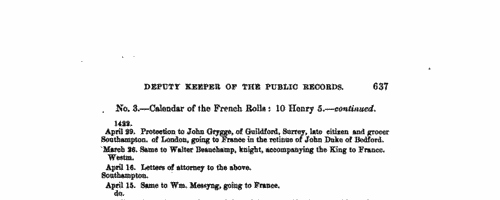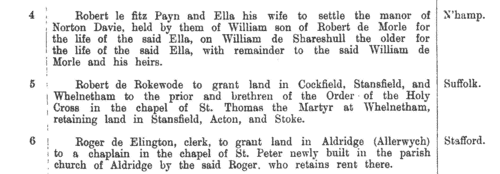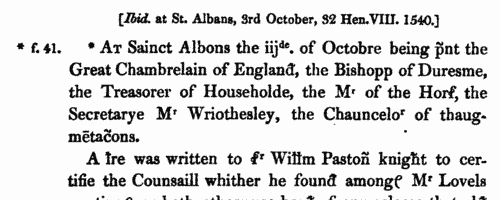Hunnyng Surname Ancestry ResultsOur indexes 1000-1999 include entries for the spelling 'hunnyng'. In the period you have requested, we have the following 5 records (displaying 1 to 5): Buy all | | | Get all 5 records to view, to save and print for £24.00 |
These sample scans are from the original record. You will get scans of the full pages or articles where the surname you searched for has been found. Your web browser may prevent the sample windows from opening; in this case please change your browser settings to allow pop-up windows from this site. Grantees of offices, commissions and pardons
(1413-1416)
The Patent Rolls are the Chancery enrolments of royal letters patent. Those for the 1st, 2nd and 3rd years of the reign of king Henry V (21 March 1413 to 20 March 1416) were edited for the Public Record Office by R. C. Fowler, and published in 1910. The main contents are royal commissions and grants; ratifications of ecclesiastical estates; writs of aid to royal servants and purveyors; and pardons. The commissions of the peace issued for the English towns and counties and entered on the rolls, being largely repetitive, have been consolidated in a single appendix.HUNNYNG. Cost: £2.00.  | Sample scan, click to enlarge

| The English in France
(1415-1416)
King Henry V of England claimed the throne of France (and quartered the fleurs-de-lis of France with the lions of England on the royal standard) as had his predecessors since Edward III, as descendants of Philip IV of France. He married Katherine, youngest daughter of king Charles VI of France in 1420, and thereafter styled himself 'heir and regent of France'. The English had real power or influence in Brittany, Normandy, Flanders and Gascony, and actual possession of several coastal garrisons, in particular Calais, where the French inhabitants had been replaced by English. The English administration kept a series of records called the French Rolls. On these are recorded royal appointments and commissions in France; letters of protection and safe-conduct to soldiers, merchants, diplomats and pilgrims travelling to France from England and returning, and to foreign legations. There are also licences to merchants to export to the Continent, and to captains to transport pilgrims. This calendar of the French Roll for the 3rd year of the reign of Henry V (21 March 1415 to 20 March 1416) was prepared by Alexander Charles Ewald and published in 1883. The battle of Agincourt took place on 25 October 1415, so this roll has many letters of protection for soldiers, and various letters and orders relating to the ransoming of French prisoners.HUNNYNG. Cost: £6.00.  | Sample scan, click to enlarge

| Landowners and tenants in Lincolnshire
(1345-1485)
Inquisitions ad quod damnum were held by the appropriate sheriff or escheator (or other officer in whose bailiwick the matter in question might lie) to investigate cases in which the royal or public interest might be damaged by proposed alienation or settlement of land (especially alienation to religious uses, into mortmain). The key findings from these inquisitions were as to the tenure of the land and the service due from it; its yearly value; the lands remaining to the grantor, and whether they sufficed to discharge all duties and customs due from him; and whether he can still be put upon juries, assizes and recognitions, so that the country be not burdened by his withdrawal from them. Generally speaking, this process had the makings of a system of licensing such alienations, and raising money in proportion to the valuations. Equally, there are many items that deal with subjects such as the closing of public roads, the felling or inclosing of woods, or the proposed grant of liberties or immunities. A calendar of these inquisitions from the 19th year of the reign of king Edward III to the 2nd year of Richard III was prepared by the Public Record Office and published in 1906. We have now indexed this calendar by surname and county. Most of the individuals appearing in the calendar are either pious individuals seeking to make grants to religious bodies for the sake of their souls; or landowners securing the disposition and settling of their real estate. But some other names do appear - tenants, trustees, chaplains and clerks.HUNNYNG. Cost: £6.00.  | Sample scan, click to enlarge

| London Liverymen: Fishmongers
(1537)
J. Caley, F.R.S., F.S.A. transcribed this 'curious record' found in the Chapter House, Westminster, 'a list of the freemen of the various companies resident in London and Westminster; from Thomas Lewyn being mentioned as sheriff, it appears it was made in the year 1537.' Thirty-seven companies are listed, comprising 2400 individuals: Armourers, Bakers, Barber Surgeons, Blacksmiths, Brewers, Broiderers, Clothworkers, Coopers, Cordwainers, Curriers, Cutlers, Drapers, Fishmongers, Fletchers, Founders, Freemasons, Fruiterers, Goldsmiths, Grocers, Haberdashers, Innholders, Ironmongers, Joiners, Leather Sellers, Merchant Taylors, Painter Stainers, Plasterers, Plumbers, Saddlers, Salters, Skinners, Spurriers, Tallow Chandlers, Tilers, Vintners, Wax Chandlers and Weavers. HUNNYNG. Cost: £6.00.  | Sample scan, click to enlarge

| Liegemen and traitors, diplomats and spies
(1540-1542)
The Privy Council of England dealt with many delicate and important matters of state. The surviving records date back as early as the 14th century, but Henry VIII on 10 August 1540, with the advice of the council, ordered that the council should have its own clerk 'to write, entre and registre all such decrees, determinacons, lettres and other such things as he shuld be appoynted to entre in a booke, to remayne alwayes as a leger, aswell for the dischardge of the sayd counsaillours touching such things as they shuld passe from tyme to tyme, as alsoo for a memoriall unto theim of their owne procedings'. The register from that date to 8 April 1542 was transcribed for the Commissioners of the Public Records by sir Harris Nicolas, and published in 1837. Although the council often dealt with petitions from aggrieved subjects, its main function was to oversee internal and external security.HUNNYNG. Cost: £4.00.  | Sample scan, click to enlarge

|
Research your ancestry, family history, genealogy and one-name study by direct access to original records and archives indexed by surname.
|







